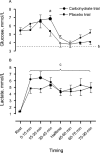Carbohydrate ingestion before and during soccer match play and blood glucose and lactate concentrations
- PMID: 24933430
- PMCID: PMC4151832
- DOI: 10.4085/1062-6050-49.3.12
Carbohydrate ingestion before and during soccer match play and blood glucose and lactate concentrations
Abstract
Context: The ingestion of carbohydrate (CHO) before and during exercise and at halftime is commonly recommended to soccer players for maintaining blood glucose concentrations throughout match play. However, an exercise-induced rebound glycemic response has been observed in the early stages of the second half of simulated soccer-specific exercise when CHO-electrolyte beverages were consumed regularly. Therefore, the metabolic effects of CHO beverage consumption throughout soccer match play remain unclear.
Objective: To investigate the blood glucose and blood lactate responses to CHOs ingested before and during soccer match play.
Design: Crossover study.
Setting: Applied research study.
Patients or other participants: Ten male outfield academy soccer players (age = 15.6 ± 0.2 years, height = 1.74 ± 0.02 m, mass = 65.3 ± 1.9 kg, estimated maximal oxygen consumption = 58.4 ± 0.8 mL·kg(-1)·min(-1)).
Intervention(s): Players received a 6% CHO-electrolyte solution or an electrolyte (placebo) solution 2 hours before kickoff, before each half (within 10 minutes), and every 15 minutes throughout exercise. Blood samples were obtained at rest, every 15 minutes during the match (first half: 0-15, 15-30, and 30-45 minutes; second half: 45-60, 60-75, and 75-90 minutes) and 10 minutes into the halftime break.
Main outcome measure(s): Metabolic responses (blood glucose and blood lactate concentrations) and markers of exercise intensity (heart rate) were recorded.
Results: Supplementation influenced the blood glucose response to exercise (time × treatment interaction effect: P ≤ .05), such that glucose concentrations were higher at 30 to 45 minutes in the CHO than in the placebo condition. However, in the second half, blood glucose concentrations were similar between conditions because of transient reductions from peak values occurring in both trials at halftime. Blood lactate concentrations were elevated above those at rest in the first 15 minutes of exercise (time-of-sample effect: P < .001) and remained elevated throughout exercise. Supplementation did not influence the pattern of response (time × treatment interaction effect: P = .49).
Conclusions: Ingestion of a 6% CHO-electrolyte beverage before and during soccer match play did not benefit blood glucose concentrations throughout the second half of exercise.
Keywords: football; intermittent exercise; rebound hypoglycemia; sports drinks; supplementation.
Figures


References
-
- Krustrup P, Mohr M, Steensberg A, Bencke J, Kjaer M, Bangsbo J. Muscle and blood metabolites during a soccer game: implications for sprint performance. Med Sci Sports Exerc. 2006;38(6):1165–1174. - PubMed
-
- Shephard RJ, Leatt P. Carbohydrate and fluid needs of the soccer player. Sports Med. 1987;4(3):164–176. - PubMed
-
- Russell M, Kingsley M. Influence of exercise on skill proficiency in soccer. Sports Med. 2011;41(7):523–539. - PubMed
-
- Bangsbo J. The physiology of soccer: with special reference to intense intermittent exercise. Acta Physiol Scand Suppl. 1994;619:1–155. - PubMed
-
- Bangsbo J, Iaia FM, Krustrup P. Metabolic response and fatigue in soccer. Int J Sports Physiol Perform. 2007;2(2):111–127. - PubMed
Publication types
MeSH terms
Substances
LinkOut - more resources
Full Text Sources
Other Literature Sources
Medical
Miscellaneous

